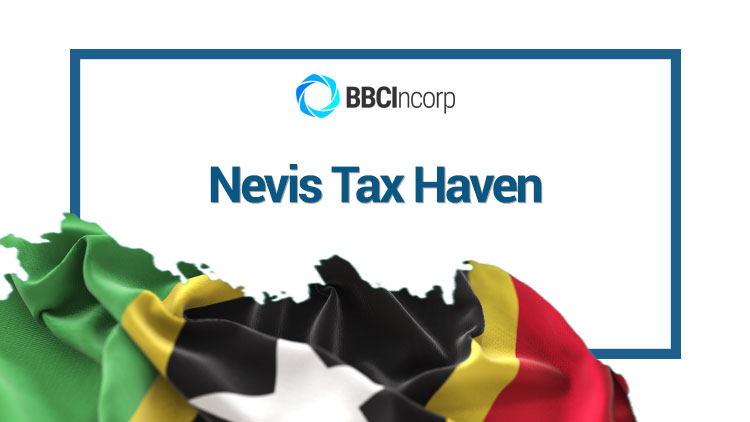
With the bloom of globalization, many business owners have been seeking opportunities to incorporate their companies in other countries but not for doing business within these borders. In other words, these countries are called offshore jurisdictions.
Nevis is a popular place that makes a notable share of the world’s offshore wealth. With the tax laws advocating offshore companies, many business owners have chosen the island for their startups. Let’s delve into the reasons why Nevis is considered as a “tax haven” – an international offshore jurisdiction where taxes are exempted or levied at a low rate for foreign businesses.
1. Some key facts about Nevis “tax haven”

Nevis is one of two nations comprising the Federation of St. Kitts & Nevis in the Caribbean Sea. The island is well-known as an widely-preferred offshore company jurisdiction in the world. Nevis designs the ideal system for offshore incorporation to collect the significant amount of revenue from the company registration and its renewal fees.
Let’s take a glance at quick facts of St. Kitts and Nevis:
- Population: 53,544 (2020)
- Primary language: English
- Currency: East Caribbean Dollar (XCD)
- Monetary authority: Eastern Caribbean Central Bank (ECCB)
- Common entity types: Nevis International Business Corporations, Nevis Limited Liability Companies
- Legal system: based on English Common Law
- Corporate Act: modeled after Delaware Company Act
The island has a small population speaking English that makes it easier for foreign investors to understand the business and situation there. As we can see from the island’s quick facts, Nevis uses Delaware Company Act to manage the company register within the border. And Delaware legislation is widely applied to handle a range of corporate cases and lawsuits, it is also an example of law for different states in the US.
2. Why Nevis for offshore businesses

There are some key reasons why many entrepreneurs and investors around the world flocking to Nevis to form their companies:
High level of corporate privacy. The anonymity of Nevis companies is maintained. The Guardian News talked about Nevis as “the world’s most secretive offshore haven” in an article published in 2018. The companies registered in the island can keep the information of company’s owners or members confidential. Moreover, the company can also use nominee directors or shareholders.
High protection of assets. Thanks to the concealment of the company’s owners, the assets are usually protected from creditors. Business operators of Nevis LLCs, for example, enjoy the most advantage of this feature.
Easy-to-understand corporate laws. The island uses English Common Law and Delaware corporate legislation, which makes it easy to be recognized.
Favorable tax policies for foreign companies. Aside from the stability of politics and economy, Nevis has favorable tax treatments which make it an ideal jurisdiction for foreign investors. This is one of the greatest advantages for most offshore business owners. Let’s discuss this characteristic in more detail.
3. Tax concerns for offshore businesses when choosing Nevis
3.1. Tax residence determination in Nevis
A company subject to or be exempted from specific tax types depends on its residency in Nevis. There are two factors to determine how a company is taxed under Nevis tax law:
- The resident or non-resident status of the company;
- The jurisdiction from which the company’s income derived.
Under St. Kitts and Nevis company act, a company is classified as a resident one if:
- It is controlled and managed from within St. Kitts and Nevis regardless whether it is formed in the island; or
- It is registered in the island as a foreign entity and conducts business within the border.
In Nevis, a company is considered as non-resident when it is registered in Nevis or other countries with the control and management is not in the island.
Resident companies are taxed on global income while non-resident companies are only subject to taxes on income sourced within St. Kitts and Nevis. The Nevis income tax rate is 33%.
3.2. Common tax policies in Nevis “tax haven”
Corporate taxation. According to the company act, non-resident Nevis companies that conduct no business in the island are exempted from corporate tax, income tax, withholding tax, stamp tax, asset tax, exchange controls, or other fees or taxes.
The exemptions are applied on companies with assets and income originating from any jurisdictions other than St. Kitts and Nevis.
No tax on any profits paid by a Nevis offshore company to its members. For a non-resident Nevis company which does not carry out any business in St. Kitts and Nevis, the amount of profits it pays for its members is not subject to any tax or withholding provisions of Nevis laws.
For an LLC, the profits are paid on the members’ interest. For a corporation, the amount of profits which are distributed to its shareholders refers to dividend payments.
No personal income tax (PIT). Nevis does not collect any tax on individual income. Therefore, members of the company registered in the island are relieved from annual tax filing obligations like in many other countries. They just need to pay the PIT in the place of residence if required.
No tax on capital gains. Gains on any capital held by an individual are not accountable to tax. With gains from the sale of assets held within a period up to one year, they are taxed at half the tax rate and not more than 20%.
Other tax exemptions. No tax is imposed on real estate, inheritance or gift, which makes Nevis a good place to invest in property.
Tax holidays. Hotel construction is provided with tax holidays and some other benefits under the Fiscal Incentives Act and Hotel Aids Act.
Updates on Tax Treatment of Nevis Corporations & LLCs (March 2020):
- Business entities which are not permanently established, controlled and managed in Nevis are not liable to taxes in the Federation.
- Any business entities which are established permanently but without holding control and management in Nevis are subject to Corporation Income Tax on income sourced from St. Kitts and Nevis.
4. Nevis as a tax haven and some considerations
Although Nevis is deemed to be a perfect place for offshore businesses, there are some disadvantages business owners should know.
Offshore companies registered in Nevis still have to comply with tax filing obligations and reporting procedures in the jurisdictions where they conduct their businesses such as corporate tax and personal income tax return, if required. For example, Nevis offshore companies are exempted from corporate taxes in the island, but if the company does business in the US, it still has to file corporate tax returns each year in the US.

5. Is Nevis “tax haven” suited for your business?
Nevis is considered as a “tax haven” with various tax exemptions and many other benefits such as layered corporate privacy, re-domiciling policy for foreign companies already existing in other jurisdictions outside Nevis.
A worth-mentioning fact is that St. Kitts and Nevis since 2017 have implemented many legislative reforms to their legal documents regarding company laws to ensure the global tax compliance principles set out by the OECD Forum for Harmful Tax Practices (FHTP) and the EU CoCG ( European Union Code of Conduct Group). This implementation has greatly attached Nevis to certain commitments towards tax transparency standards. Nevis, as a result, is still recognized as a safe and favorable “tax haven” for most investors and entrepreneurs worldwide.
Nevis is a recommended place to go for those who want to set up an offshore company for some specific purposes such as business expansion, optimum financial planning or investment opportunities.
Disclaimer: While BBCIncorp strives to make the information on this website as timely and accurate as possible, the information itself is for reference purposes only. You should not substitute the information provided in this article for competent legal advice. Feel free to contact BBCIncorp’s customer services for advice on your specific cases.
Get helpful tips and info from our newsletter!
Stay in the know and be empowered with our strategic how-tos, resources, and guidelines.



